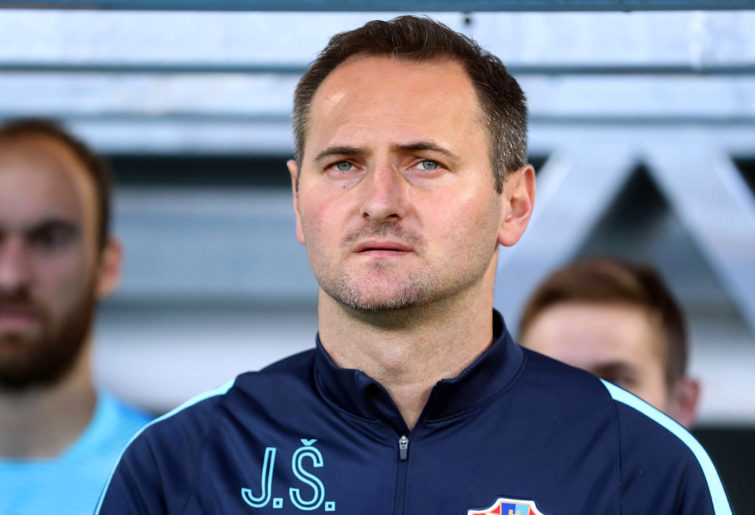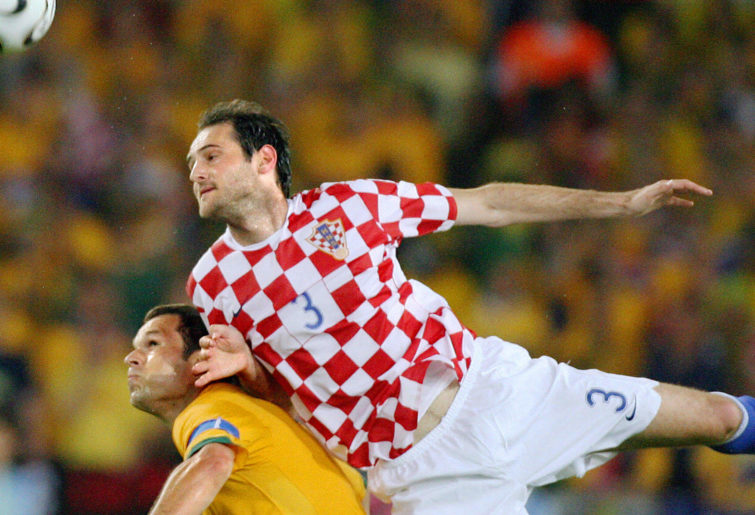Young excellence, promotion battles, and a happy farewell: The Australian team of the week from players around the globe
Even though St.Pauli ultimately lost a high-scoring affair, Jackson Irvine was a standout, as well as scoring a late goal.
Josip Simunic is one of the finest footballers Australia has ever produced, even if he played against the Socceroos instead of for them.
Now with his playing days well behind him, Simunic sits down with Michael Cain to look back on his career, from the early days at the AIS to finishing up at Zagreb – and, of course, those three yellow cards at the World Cup against Australia back in 2006.
» Watch the full interview in the player above
Stints at large clubs in the Bundesliga and a 105-game international career do not come easy. Simunic was set on to the path of a career in football from a young age with the help of the setup at the AIS under head coach Ron Smith.
“I was the luckiest person in the world. Being from Canberra I used to go and watch the Institute even a few years before I came, and I’d seen it was a really high level, seen great players come out of there. I used to watch almost all their games.
“The moment when Ron Smith called and asked if I’d be interested in coming to the Institute – that was like being chosen to go to Real Madrid or Barcelona or Liverpool or Manchester United. It was amazing.”
Originally an attacking midfielder with an admittedly limited aerobic capacity, it was Smith who suggested a positional switch for Simunic which turned out to be a pivotal move.
“Thank god someone understood football how he understood it. He looked at every detail and came to have a chat with me and my father and said, ‘Listen, I think you’re potentially going to have some problems if you go overseas and try to play this position’.
“He explained to me how and why, and everything made sense. So I said, ‘Okay, I’ll play at the back’ because as a central defender you run not as much as anywhere else on the field. From the other point of view, I had the qualities to still make a pretty good career.”
Simunic is now the coach of the Croatian under-19 side and the lessons he received from Smith all those years ago are still as relevant as ever.
“I’ve learnt a lot from Ron, I still speak to him today. I get some pointers here and there and I’m very grateful for that.”

(Photo credit STR/AFP via Getty Images)
Asked about the state of football in Australia Simunic considers the standard of play in the A-League reasonably high. However, there’s one aspect of the league he thinks needs to improve.
“The youth part, the development part, it’s dropped off a lot and it’s a shame.”
One thing that certainly wasn’t helpful to youth development in Australia was the closure of the FFA’s Centre of Excellence at the AIS in 2017.
“I think it was 100 per cent a mistake [to close the football program]. I think the way it was set up back then, in my youth, was more than adequate. It’s just a shame it’s not around anymore. It’s a shame people like [Smith] are not involved in football in Australia – I find that very hard to believe. Ron Smith was 30 years in front of anyone as a coach.”
You can also add Simunic to the growing list of supporters of a national second-tier competition in Australia to sit under the A-League and become linked through promotion and relegation.
“I think the extra pressure for all the players, for the coaches, I think that’s the only way that football at a senior level can go further.
“You’re probably the second or third last, or last, you’ve got ten games to go and it doesn’t mean anything. It has to have that meaning, when you have to try to win a few games to stay up in the league it’s got a lot more meaning to it.”
» Watch the full interview in the player above
It’s the moment of Simunic’s career Australian football fans will remember more than any other: the big centre back staying on the field after being yellow-carded twice, and it wasn’t until Graham Poll produced a third yellow that a red card was forthcoming.
That infamous moment capped off an intense match with the 2-2 draw enough for the Socceroos at Croatia’s expense. But even though there was so much on the line going up against his country of birth, Simunic doesn’t recall being nervous before the must-win match.
“You know what? It was a game like every other game. It’s nice, it’s a nice experience. You’re at a World Cup, it happens to be that Croatia are playing against Australia, and most of the players from Australia I knew because we were at the Institute together, it was a nice experience.
“Unfortunately for us, we didn’t get to the next round. But if we weren’t going to the next round, if it was a team like Australia, it was a little easier for me, so at least Australia went through, and deservedly so.”
The story goes that because of his accent, Poll mistook Simunic for Australian defender Craig Moore and that’s how he stayed on the park after receiving two yellow cards.
“My Australian accent helped me with Graham Poll.”
After the game, Simunic went up to Poll and offered a handshake as is customary. He didn’t get a handshake, but he did receive a third yellow card.
“He didn’t want to give me his hand and it wasn’t really nice.
“I basically had a go at him and that’s why he gave me a third yellow. But that’s all spur of the moment. I was angry we didn’t get through. I was very frustrated, but that’s life. It’s all been and gone.”

(Photo credit MICHAEL URBAN/AFP via Getty Images)
After more than a decade in the Bundesliga, the final chapter in Simunic’s playing days was a three-year stint at Dinamo Zagreb – an intense last stop on the way to retirement.
“Always, always [pressure]. I think the pressure, me being an older player back then, I actually loved having that pressure.
“When that pressure’s not there, it’s not the same. You have responsibilities – every player has responsibilities but the older players especially. But that’s all part of the game, at the end of the day that’s part of the world we live in. You have to take responsibilities and do the best you can.”
One of his main responsibilities was marking some of the top forwards in world football, but Simunic says there were two who stood out as the toughest to handle.
“I have to say Mark Viduka was one of the hardest. And probably Zlatan Ibrahimovic. He was the one who had absolutely everything. He was amazing, he’s still playing so he’s an amazing player.”
Looking back at his career, Simunic has few regrets.
“The only thing I would’ve changed is to try to play in as many countries as possible to learn the culture, the languages. My time in Germany was amazing – I was there for 14 full years and it’s a beautiful country.
“But for me, after football, it would’ve been better to learn a few more languages, learn about the cultures. For me as a person that would have been a lot better. But I’m still very happy with everything and how it turned out.”
» Watch the full interview in the player above